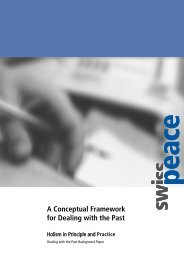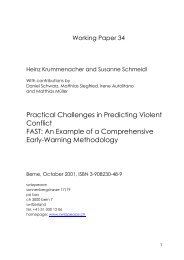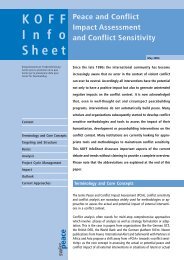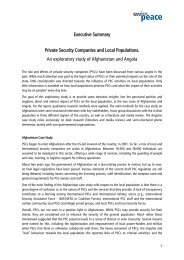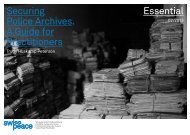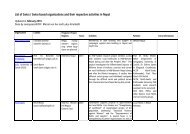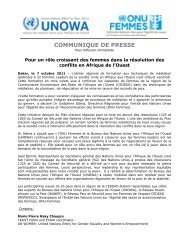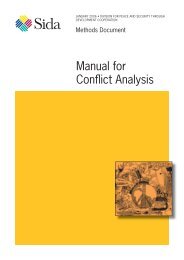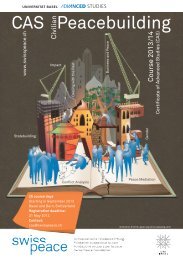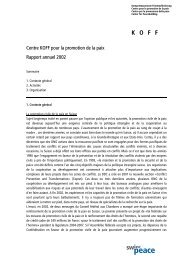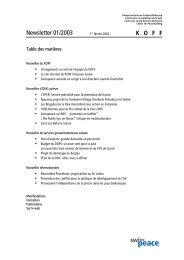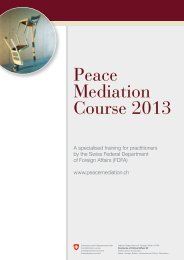Unpacking the Mystery of Mediation in African Peace ... - Swisspeace
Unpacking the Mystery of Mediation in African Peace ... - Swisspeace
Unpacking the Mystery of Mediation in African Peace ... - Swisspeace
You also want an ePaper? Increase the reach of your titles
YUMPU automatically turns print PDFs into web optimized ePapers that Google loves.
Western Sahara, The Baker Plans<br />
po<strong>in</strong>ts <strong>of</strong> <strong>the</strong> proposals, which later became<br />
known as <strong>the</strong> “Settlement Plan”, were a ceasefire<br />
and a popular referendum on <strong>the</strong> future status <strong>of</strong><br />
Western Sahara. 236 The UN Mission for <strong>the</strong> Referendum<br />
<strong>in</strong> Western Sahara (MINURSO) was established<br />
<strong>in</strong> 1991, <strong>the</strong> ma<strong>in</strong> po<strong>in</strong>ts <strong>of</strong> its mandate<br />
be<strong>in</strong>g <strong>the</strong> monitor<strong>in</strong>g <strong>of</strong> <strong>the</strong> ceasefire and <strong>the</strong> organization<br />
<strong>of</strong> a free and fair referendum. 237 The<br />
ceasefire was announced on 6 September 1991 <strong>in</strong><br />
agreement with both parties and has largely held<br />
until today. In 1993, <strong>the</strong> UN set up an Identification<br />
Commission (IDC) mandated with <strong>the</strong> task<br />
<strong>of</strong> compil<strong>in</strong>g a list <strong>of</strong> voters for <strong>the</strong> referendum.<br />
The process was repeatedly stalled by recurr<strong>in</strong>g<br />
disagreements between <strong>the</strong> parties over <strong>the</strong> criteria<br />
for registration and <strong>the</strong> def<strong>in</strong>ition <strong>of</strong> <strong>the</strong> electorate.<br />
The IDC concluded its activities <strong>in</strong> 2004<br />
after hav<strong>in</strong>g presented two provisional voter<br />
lists. 238<br />
On 18 March 1997, UN Secretary-General K<strong>of</strong>i<br />
Annan appo<strong>in</strong>ted former US secretary <strong>of</strong> state<br />
James A. Baker his personal envoy for Western<br />
Sahara. After visit<strong>in</strong>g <strong>the</strong> region and separately<br />
meet<strong>in</strong>g with <strong>the</strong> leaders <strong>of</strong> <strong>the</strong> two parties, he <strong>in</strong>vited<br />
<strong>the</strong> government <strong>of</strong> Morocco, <strong>the</strong> Frente<br />
Polisario, and <strong>the</strong> governments <strong>of</strong> Algeria and<br />
Mauritania to direct talks <strong>in</strong> London. All <strong>the</strong> parties<br />
sent <strong>the</strong>ir delegations. After four rounds <strong>of</strong> direct<br />
talks <strong>in</strong> London, Lisbon, and Houston, on<br />
14-16 September 1997 an agreement was reached<br />
on a number <strong>of</strong> critical issues, <strong>in</strong>clud<strong>in</strong>g voter<br />
identification, refugee issues, and prisoners <strong>of</strong><br />
war. However, <strong>the</strong> agreement did not lead to a<br />
breakthrough towards peace, and <strong>the</strong> fundamental<br />
positions <strong>of</strong> <strong>the</strong> parties rema<strong>in</strong>ed far apart. In<br />
May 2000, Baker arranged aga<strong>in</strong> direct meet<strong>in</strong>gs<br />
with <strong>the</strong> parties with <strong>the</strong> aim to resolve <strong>the</strong> problems<br />
relat<strong>in</strong>g to <strong>the</strong> implementation <strong>of</strong> <strong>the</strong> Settlement<br />
Plan. However, several rounds <strong>of</strong> talks<br />
did not lead to any compromise. Ra<strong>the</strong>r, Baker<br />
concluded that <strong>the</strong> talks had even deepened <strong>the</strong><br />
differences between <strong>the</strong> parties. 239 Annan agreed<br />
with Baker that <strong>the</strong>re were “serious doubts<br />
236 United Nations: “Security Council Resolution 690” (29 April<br />
1991).<br />
237 MINURSO: “Overview <strong>of</strong> <strong>the</strong> Mission Mandate“,<br />
(http://www.m<strong>in</strong>urso.unlb.org/mission.html).<br />
238 MINURSO: “Milestones <strong>in</strong> <strong>the</strong> Western Sahara Conflict”, p. 3,<br />
(http://www.m<strong>in</strong>urso.unlb.org/milestones.pdf).<br />
239 Jensen, Erik: “Western Sahara – Anatomy <strong>of</strong> a Stalemate”,<br />
Colorado USA: Lynne Riener Publishers (2005), p. 103.<br />
whe<strong>the</strong>r <strong>the</strong> Settlement Plan can be implemented<br />
<strong>in</strong> its present form” 240 and that an alternative solution<br />
had to be found<br />
Negotiation Phase<br />
Negotiation Setup and Process<br />
In 2001, Baker worked out a plan entitled <strong>the</strong><br />
Personal Envoy’s Draft Framework Agreement,<br />
also known as Baker Plan I, and presented it to<br />
<strong>the</strong> parties. The document was strenuously rejected<br />
by representatives <strong>of</strong> Polisario, who stated<br />
that it aimed at “<strong>the</strong> precipitous <strong>in</strong>tegration <strong>of</strong> <strong>the</strong><br />
Saharan Territory <strong>in</strong>to Morocco”. 241 Both Polisario<br />
and Algeria refused to even discuss it any<br />
fur<strong>the</strong>r, and Baker soon had to accept its complete<br />
failure.<br />
In March 2003, Annan presented to <strong>the</strong> Security<br />
Council Baker’s “<strong>Peace</strong> Plan for Self-<br />
Determ<strong>in</strong>ation <strong>of</strong> <strong>the</strong> People <strong>of</strong> Western Sahara”,<br />
which would also be known as <strong>the</strong> Baker Plan<br />
II. 242 The Frente Polisario <strong>in</strong>itially expressed extensive<br />
criticism concern<strong>in</strong>g different po<strong>in</strong>ts <strong>of</strong><br />
<strong>the</strong> Baker Plan II. However, <strong>in</strong> a surpris<strong>in</strong>g move,<br />
it soon <strong>of</strong>ficially accepted it. This was seen by<br />
some as a tactical maneuver, s<strong>in</strong>ce Morocco had<br />
counted on Polisario to reject <strong>the</strong> plan. By <strong>the</strong><br />
time <strong>of</strong> Polisario’s acceptance <strong>of</strong> <strong>the</strong> plan, Morocco<br />
had already replied critically to many aspects<br />
<strong>of</strong> <strong>the</strong> plan. In a letter to Baker dated 9<br />
April 2004, <strong>the</strong> government <strong>of</strong> Morocco rejected<br />
<strong>the</strong> Baker Plan II. In June 2004, Baker resigned<br />
as personal envoy.<br />
Key Issues dur<strong>in</strong>g Negotiations<br />
The ma<strong>in</strong> element <strong>of</strong> dispute is a UN-backed referendum<br />
on <strong>the</strong> political status <strong>of</strong> Western Sahara;<br />
particularly contentious are <strong>the</strong> scope <strong>of</strong> <strong>the</strong><br />
referendum as well as <strong>the</strong> vot<strong>in</strong>g population. Polisario<br />
has <strong>in</strong>sisted that only <strong>in</strong>dividuals who were<br />
registered dur<strong>in</strong>g a census held <strong>in</strong> 1974 would<br />
qualify. That census only registered part <strong>of</strong> <strong>the</strong><br />
Sahrawi population, s<strong>in</strong>ce a lot <strong>of</strong> <strong>the</strong> <strong>in</strong>habitants<br />
240 Ibid., p. 106.<br />
241 United Nations: “Report <strong>of</strong> <strong>the</strong> Secretary-General S/2003/41”<br />
(10 January 2002).<br />
242 United Nations: “<strong>Peace</strong> plan for self-determ<strong>in</strong>ation <strong>of</strong> <strong>the</strong> people<br />
<strong>of</strong> Western Sahara”, <strong>in</strong>: Report <strong>of</strong> <strong>the</strong> Secretary-General<br />
S/2003/565, Annex II (2003).<br />
87




